Introduction
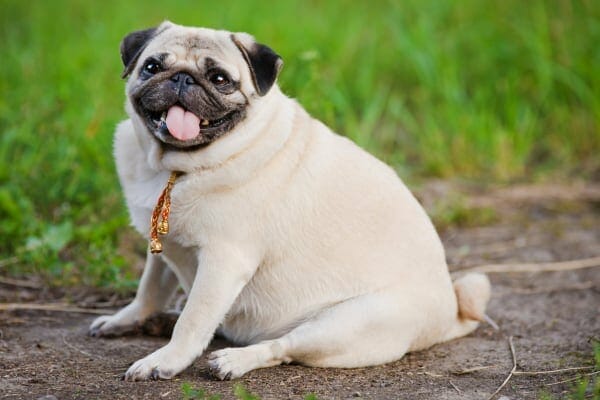
Obesity is a growing concern among dogs, and helping an overweight dog lose weight is essential for their overall health and well-being. Dogs, like humans, can face various health risks if they are carrying excess weight. From joint problems to heart conditions, obesity can have serious consequences for our furry friends. Understanding the importance of addressing this issue is the first step towards helping your dog achieve a healthier weight. By implementing a well-planned weight loss program that includes diet modifications and exercise routines, you can support your dog in shedding those extra pounds and improving their quality of life.
Understanding the importance of helping an overweight dog

It is essential to recognize the importance of helping an overweight dog achieve a healthy weight. Just like humans, excess weight can lead to a range of health issues in dogs. Obesity puts strain on their joints, leading to arthritis and decreased mobility. It can also cause heart problems, diabetes, and even shorten their lifespan. Additionally, overweight dogs may experience difficulty breathing and decreased stamina. By addressing their weight issue, we can improve their overall quality of life and reduce the risk of developing serious health complications. Therefore, it is crucial to take action and help our furry friends shed those extra pounds.
Common health risks associated with obesity in dogs

One of the key reasons why it's important to help an overweight dog lose weight is to mitigate the various health risks associated with obesity. Obesity in dogs can lead to a range of serious health issues. Excess weight puts excessive strain on a dog's joints and can lead to arthritis and mobility problems. Furthermore, overweight dogs are prone to developing diabetes, heart disease, and respiratory issues. Obesity also increases the risk of certain types of cancer in dogs. Additionally, obese dogs are more likely to experience decreased immune function and have a higher susceptibility to infections. It's crucial for dog owners to understand these risks and take proactive steps to help their furry companions maintain a healthy weight.
Assessing your dog's weight
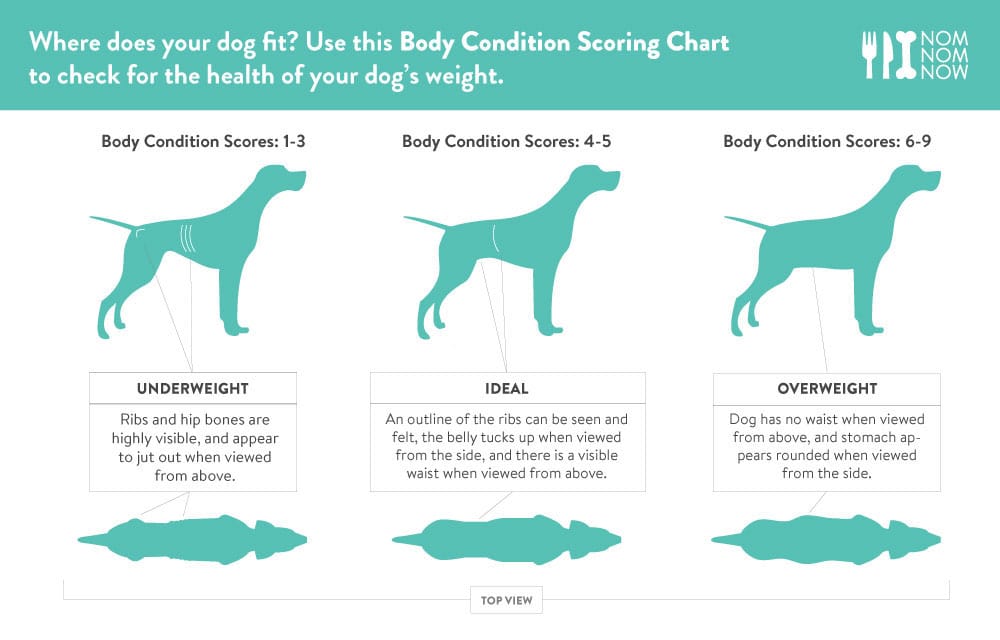
Assessing your dog's weight is an important step in helping them lose excess pounds. One way to do this is by identifying the signs of overweight in dogs. Look for a lack of waist definition, difficulty feeling ribs, and a visibly rounded abdomen. Additionally, you can measure their body condition score (BCS) to get a more accurate assessment. The BCS ranges from 1 to 9, with 1 being severely underweight and 9 being obese. Ideally, your dog should fall into the range of 4 to 5, where they have a defined waist and their ribs are easily felt without excess fat covering them. By assessing your dog's weight, you can better understand their current condition and tailor a weight loss plan accordingly.
Identifying the signs of overweight in dogs

Identifying the signs of overweight in dogs is an essential step in helping them achieve a healthier weight. There are several indicators that can help you determine if your dog is carrying excess weight. One obvious sign is if their ribs are not easily felt when you run your hands over their sides. Additionally, a lack of a visible waistline, a protruding abdomen, or difficulty in moving around may indicate that your dog is overweight. It's important to pay attention to these signs and consult with a veterinarian to confirm if your dog needs to lose weight and develop an appropriate plan for their well-being.
Measuring your dog's body condition score (BCS)
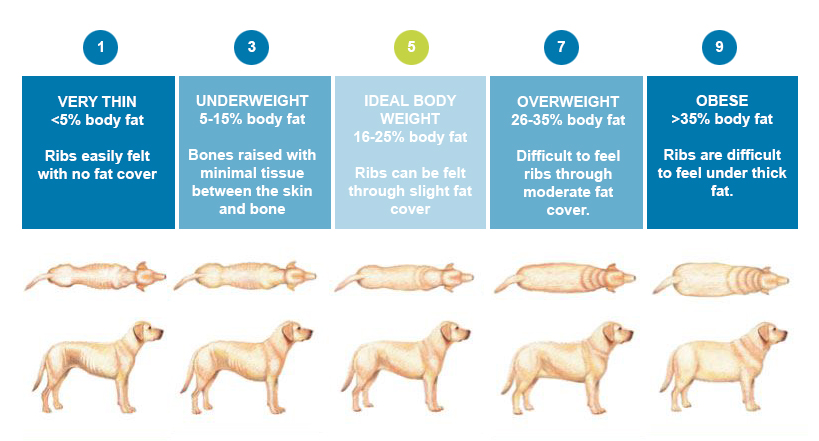
Measuring your dog's body condition score (BCS) is an important step in assessing their weight and overall health. BCS is a visual and tactile evaluation of your dog's body shape and fat distribution. Start by observing your dog from various angles, looking for signs of excess weight such as a lack of visible waist or an inability to feel their ribs easily. Then, use your hands to palpate their body, feeling for layers of fat. The BCS scale typically ranges from 1 to 9, with lower scores indicating underweight and higher scores indicating overweight or obese. By accurately measuring your dog's BCS, you can better determine the appropriate steps to help them lose weight safely and effectively.
Creating a weight loss plan

Creating a weight loss plan for an overweight dog is crucial in helping them shed those extra pounds and improve their overall health. The first step is to consult with a veterinarian who can provide a personalized plan based on your dog's specific needs. They will consider factors such as age, breed, and activity level. It's important to set realistic goals for your dog's weight loss journey, aiming for gradual and steady progress rather than rapid results. This ensures that they safely lose weight without compromising their overall well-being. With a well-crafted weight loss plan, you can help your dog achieve optimal health and longevity.
Consulting with a veterinarian for a personalized plan

During the weight loss journey of your overweight dog, it is crucial to consult with a veterinarian for a personalized plan. Veterinarians are experts in animal health and can provide valuable guidance specific to your dog's needs. They can assess your dog's overall health, identify any underlying conditions that may contribute to weight gain, and determine an appropriate weight loss goal. Additionally, they can recommend a suitable diet and exercise regimen based on your dog's age, breed, and activity level. A personalized plan from a veterinarian ensures that your dog's weight loss journey is safe, effective, and tailored to their individual needs.
Setting realistic goals for your dog's weight loss journey

When embarking on a weight loss journey for your overweight dog, it is crucial to set realistic goals. Remember that weight loss should be gradual and sustainable to ensure the health and well-being of your pet. Aim to help your dog lose between 1-2% of their body weight per week, as losing weight too quickly can have negative effects on their overall health. Consult with your veterinarian to determine the ideal target weight for your dog and establish a timeline for reaching that goal. By setting realistic goals, you can ensure a safe and effective weight loss journey for your furry friend.
Adjusting the diet
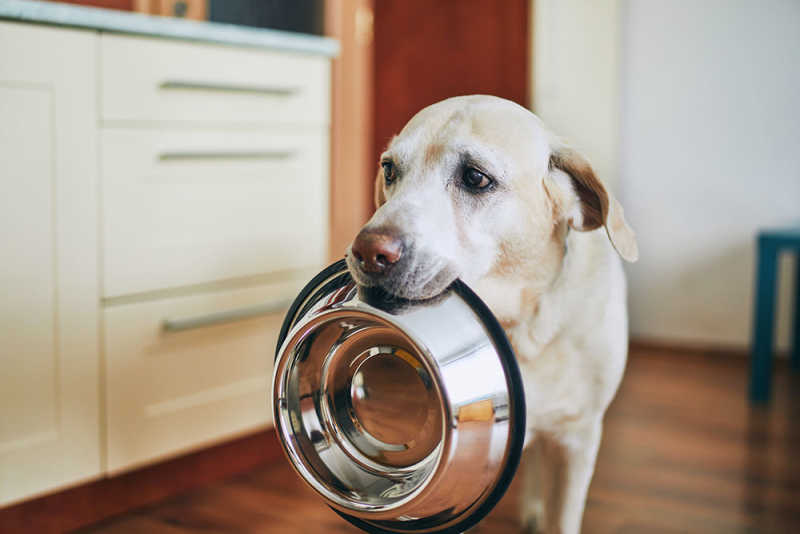
Adjusting the diet is a crucial step in helping an overweight dog lose weight. When it comes to selecting the right food for weight loss, it is essential to choose a high-quality, weight loss dog food. Look for options that are specifically formulated for weight management and have lower calorie content.
Controlling portion sizes and meal frequency is also important. It may be necessary to reduce the amount of food your dog consumes at each meal and limit the number of meals per day. This can prevent overeating and help maintain a consistent calorie intake.
Additionally, incorporating healthy treats into your dog's diet can help with weight loss. Choose low-calorie treats or use small portions of their regular food as rewards during training sessions.
Remember to consult with your veterinarian before making any significant changes to your dog's diet. They can provide guidance on selecting the right food and creating a customized feeding plan based on your dog's specific needs.
Choosing a high-quality, weight loss dog food
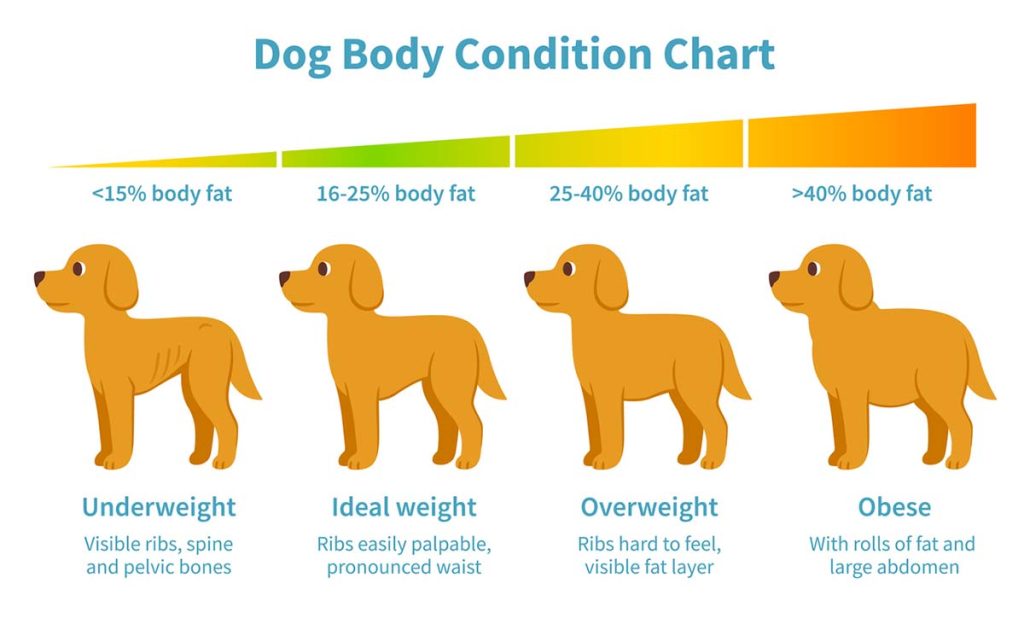
Choosing a high-quality, weight loss dog food is crucial when helping your overweight dog shed those extra pounds. Look for dog foods that are specifically formulated for weight management, as these often have reduced fat and calorie levels. Opt for brands that use real and wholesome ingredients, avoiding fillers and by-products. Make sure the food is balanced and provides essential nutrients to support your dog's overall health during the weight loss journey. Additionally, consider consulting with your veterinarian to get recommendations tailored to your dog's specific needs. Remember, choosing the right food is an important step in helping your furry friend reach a healthier weight.
Controlling portion sizes and meal frequency

Controlling portion sizes and meal frequency is crucial when helping an overweight dog lose weight. It's important to measure your dog's food and ensure they are receiving the appropriate amount for their size and weight. This means following the recommended feeding guidelines provided by the dog food manufacturer or consulting with a veterinarian for personalized advice. Additionally, it may be necessary to reduce the number of meals served each day. Instead of free-feeding or leaving food out all day, establish set meal times and stick to them to prevent overeating. By monitoring portion sizes and meal frequency, you can effectively manage your dog's calorie intake and support their weight loss journey.
Incorporating exercise

Regular exercise is an essential component of a weight loss plan for overweight dogs. Incorporating exercise not only helps burn calories but also improves your dog's overall fitness and well-being. When designing an exercise routine for your dog, it's crucial to consider their age, breed, and current fitness level. Start with low-impact activities such as brisk walks or swimming and gradually increase the intensity and duration over time. Engage in fun activities like playing fetch or setting up agility courses to keep your dog interested and motivated. Always prioritize safety, providing ample water breaks during exercise sessions to prevent dehydration. Be consistent with your daily exercise routine to ensure effective weight loss for your dog.
Designing a safe and effective exercise routine

When it comes to helping an overweight dog lose weight, designing a safe and effective exercise routine is crucial. Start by considering your dog's age, breed, and overall health condition. It's important to choose exercises that are low impact and gentle on the joints to minimize any potential strain or injury. Activities like swimming, brisk walking, or using a treadmill can be great options. Gradually increase the duration and intensity of the exercise sessions over time to help your dog build stamina and burn calories. Always make sure to provide plenty of water breaks and monitor your dog for any signs of fatigue or discomfort during the exercise routine.
Engaging in fun activities to keep your dog active

Engaging in fun activities is a crucial part of helping an overweight dog lose weight. Regular exercise not only aids in burning calories but also improves overall fitness and mental well-being. There are numerous activities you can enjoy with your dog to keep them active and entertained. Take them for daily walks or hikes, play fetch in the park, or enroll them in agility classes. Swimming is also an excellent low-impact exercise option that is gentle on their joints. Additionally, interactive toys like puzzle feeders or hide-and-seek games can provide mental stimulation while encouraging physical activity. Remember to gradually increase the intensity and duration of exercises to prevent any injuries or exhaustion.
Monitoring progress

Monitoring progress is a crucial step in helping an overweight dog lose weight. Regularly tracking your dog's weight loss and body condition score (BCS) allows you to evaluate the effectiveness of the weight loss plan and make necessary adjustments. Weigh your dog at consistent intervals and record the measurements to have a clear picture of their progress over time. Additionally, assess their BCS regularly by feeling their ribs and waistline to ensure they are gradually slimming down. By monitoring progress diligently, you can stay motivated and maintain accountability for your dog's weight loss journey.
Tracking your dog's weight loss and body condition score
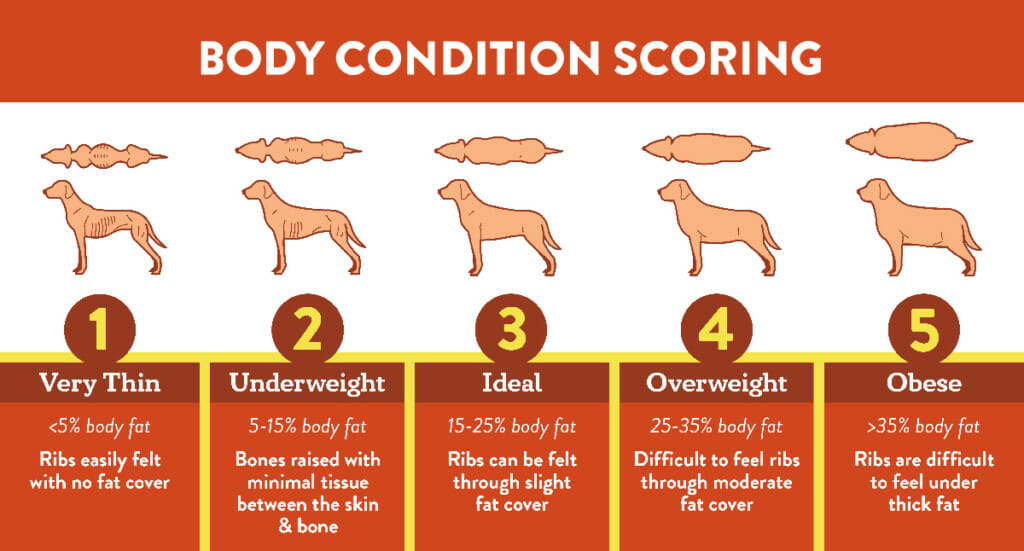
Tracking your dog's weight loss and body condition score is crucial in monitoring their progress throughout their weight loss journey. Regularly weighing your dog and recording their weight is a simple yet effective way to track their progress. Additionally, using a body condition scoring system can provide a more comprehensive assessment of their overall body composition. This system evaluates factors such as ribs, waistline, and muscle tone to determine if your dog is at an ideal weight. By consistently monitoring these measurements, you can make necessary adjustments to the weight loss plan and ensure that your dog is on track towards achieving a healthier weight.
Making necessary adjustments to the weight loss plan

Once you have started your overweight dog on a weight loss plan, it is important to regularly monitor their progress and make any necessary adjustments. Every dog is unique, and their weight loss journey may require modifications along the way. Monitoring your dog's weight loss and body condition score can help you determine if any changes need to be made to their diet or exercise routine. If your dog is not losing weight at the desired rate, you may need to reduce their calorie intake or increase their activity level. On the other hand, if your dog is losing weight too quickly, you may need to adjust their meal portions or consult with a veterinarian for guidance. Regularly assessing and adapting your dog's weight loss plan ensures that they are on the right track towards reaching a healthy weight.
Behavioral considerations

When helping an overweight dog lose weight, it's important to address behavioral considerations that may contribute to their weight gain. One common issue is food begging, where dogs constantly seek food even when they're not hungry. It's crucial to resist the temptation to give in and instead establish a consistent feeding schedule. Emotional eating can also be a factor, particularly if the dog uses food as a coping mechanism. Identifying these behaviors and finding alternative ways to meet their emotional needs through exercise or mental stimulation can support their weight loss journey. Additionally, addressing any underlying behavioral issues through training or seeking professional help can improve the overall success of the weight loss plan.
Dealing with food begging and emotional eating

One of the challenges when helping an overweight dog lose weight is dealing with food begging and emotional eating. Many dogs have a natural instinct to beg for food, which can be difficult to resist. However, it's important to establish boundaries and not give in to their pleas for extra food or treats. Instead, redirect their attention by offering healthy alternatives such as chew toys or interactive puzzle feeders. Emotional eating can also be a contributing factor to weight gain. If you notice your dog using food as a coping mechanism, try implementing positive reinforcement techniques like praise or playtime to distract them from seeking comfort in food. By addressing these behaviors, you can support your dog's weight loss journey and promote healthier habits overall.
Addressing any underlying behavioral issues

Addressing any underlying behavioral issues is an essential aspect of helping an overweight dog lose weight. While diet and exercise play a significant role, certain behavioral factors can contribute to weight gain and hinder progress. It's essential to address these issues to ensure long-term success.
One common issue is food begging or emotional eating, where the dog seeks food for comfort rather than hunger. Through training and behavior modification techniques, such as establishing a consistent feeding routine and redirecting attention when the dog begs for food, these behaviors can be gradually corrected.
Additionally, it's important to address any underlying behavioral issues that may contribute to overeating or lack of exercise. Anxiety, boredom, or even pain can lead to excessive eating or reduced activity levels. Identifying and addressing these issues will not only help with weight loss but improve the overall well-being of the dog.
Behavioral therapy, along with veterinary guidance, can be beneficial in overcoming these challenges. A professional dog trainer or behaviorist can provide guidance on behavior modification techniques tailored to the specific needs of your overweight dog.
By addressing any underlying behavioral issues, you can create an environment that supports healthy habits and aids in your dog's weight loss journey.
Seeking professional guidance
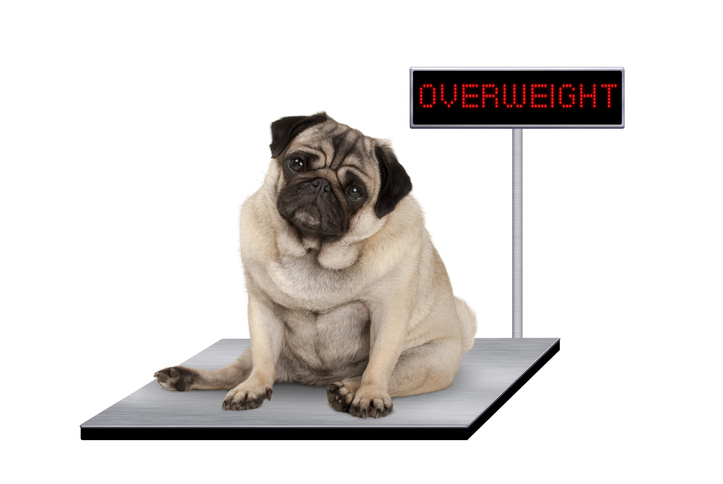
When it comes to helping an overweight dog lose weight, seeking professional guidance can be incredibly valuable. In some cases, consulting with a professional dog trainer or behaviorist may be necessary to address any underlying behavioral issues that are contributing to your dog's weight gain. These experts can provide insight and techniques for managing food begging, emotional eating, and other related behaviors. Additionally, involving a veterinary nutritionist can offer a specialized approach in developing a customized diet plan for your dog's weight loss journey. By working alongside professionals, you can ensure that you have the knowledge and support needed to help your dog achieve their weight loss goals safely and effectively.
When to involve a professional dog trainer or behaviorist

If you're struggling with behavioral issues related to your overweight dog's weight loss journey, it may be time to involve a professional dog trainer or behaviorist. These experts can offer invaluable guidance and support in addressing issues such as food begging, emotional eating, or any underlying behavioral problems. A professional trainer or behaviorist has the experience and knowledge to help modify your dog's behaviors and establish healthier habits. They can provide personalized training plans, teach you effective techniques, and ensure that your dog's weight loss journey is successful. Consider reaching out to a professional if you're encountering challenges that you're unable to overcome on your own.
Considerations for working with a veterinary nutritionist
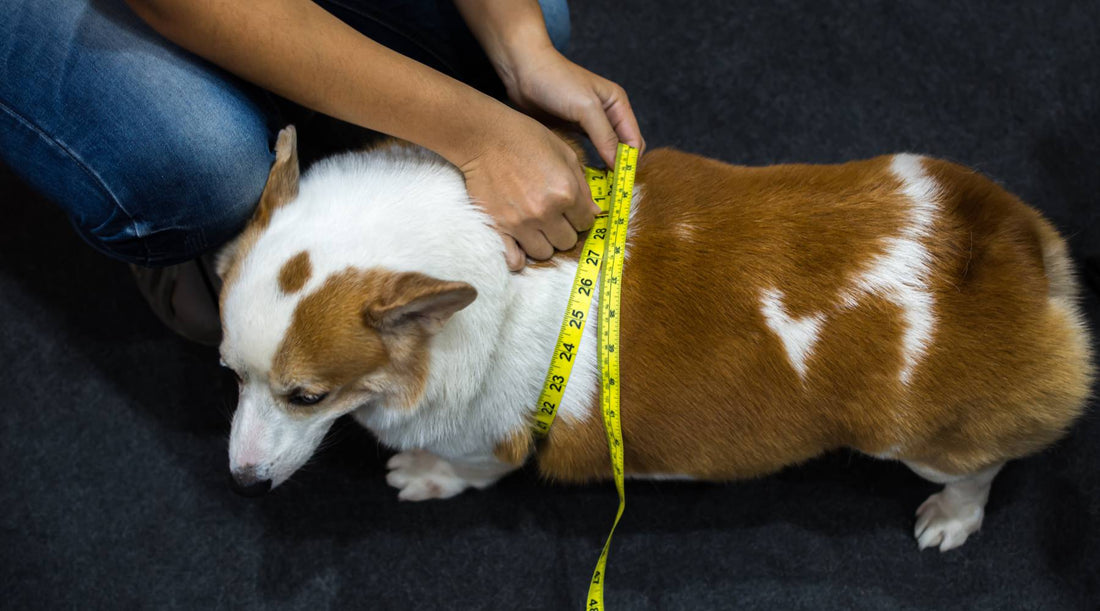
Working with a veterinary nutritionist can be a valuable step in helping your overweight dog lose weight and maintain a healthy lifestyle. When seeking the guidance of a veterinary nutritionist, there are a few considerations to keep in mind. First and foremost, choose a nutritionist who is certified or has advanced training in veterinary nutrition. This ensures that they have the necessary expertise to meet your dog's specific dietary needs. Additionally, communication is key. Make sure to provide the nutritionist with accurate information about your dog's health history, current diet, and any other relevant factors. This will help them create a personalized and effective weight loss plan for your furry friend. Regular follow-up appointments with the nutritionist are also important to monitor your dog's progress and make any necessary adjustments to their diet plan. With the guidance of a skilled veterinary nutritionist, you can provide the best possible care for your overweight dog.
Maintenance and long-term care

After successfully helping your overweight dog shed those extra pounds, the next step is to focus on maintenance and long-term care. This stage is crucial to ensure that your dog stays at a healthy weight and avoids future weight gain.
Transitioning into a weight maintenance plan involves finding the right balance of diet and exercise for your dog. Gradually increase their caloric intake while still monitoring portion sizes to prevent overfeeding. It's important to continue feeding them a high-quality, balanced diet suitable for their age and breed.
In addition to maintaining a healthy diet, regular exercise should remain a priority. Continue engaging in daily physical activities with your dog to keep them active and mentally stimulated. Regular walks, play sessions, and interactive toys can help maintain their weight loss while providing enjoyment.
Promoting a healthy lifestyle for your dog's overall well-being is another essential aspect of long-term care. This includes providing mental stimulation, socialization opportunities, and regular veterinary check-ups. A well-rounded approach will ensure your dog maintains optimal health and continues to thrive after reaching their weight loss goals.
Remember, keeping an eye on your dog's body condition score (BCS) is crucial during this phase as well. Regular monitoring allows you to make any necessary adjustments to their diet or exercise routine if needed.
By focusing on maintenance and incorporating these long-term care practices, you can provide your dog with the best chance at sustained weight management and overall well-being.
Transitioning into a weight maintenance plan

Transitioning into a weight maintenance plan is a crucial step in ensuring your overweight dog maintains a healthy weight for the long term. Once your dog has reached their target weight, it's important to gradually transition them from the weight loss plan to a maintenance plan. This involves adjusting their calorie intake and exercise routine to maintain their current weight. A gradual increase in calories and a balanced diet is essential to prevent further weight gain. It's advisable to consult with your veterinarian to determine the appropriate calorie intake and create a well-rounded maintenance plan for your furry friend's continued health and wellbeing.
Promoting a healthy lifestyle for your dog's overall well-being

It is essential to promote a healthy lifestyle for your dog's overall well-being, even after they have reached their ideal weight. This involves maintaining a balanced diet and continuing regular exercise. Feed your dog a nutritious diet appropriate for their age, size, and breed to ensure they are getting all the necessary nutrients. Consider incorporating fresh fruits and vegetables as occasional treats. Additionally, keep up with regular vet check-ups to monitor your dog's health and weight. Remember to provide mental stimulation through interactive toys or puzzles and offer plenty of love and attention to support their emotional well-being. By fostering a healthy lifestyle, you can help your dog enjoy a long and happy life.




0 Comments